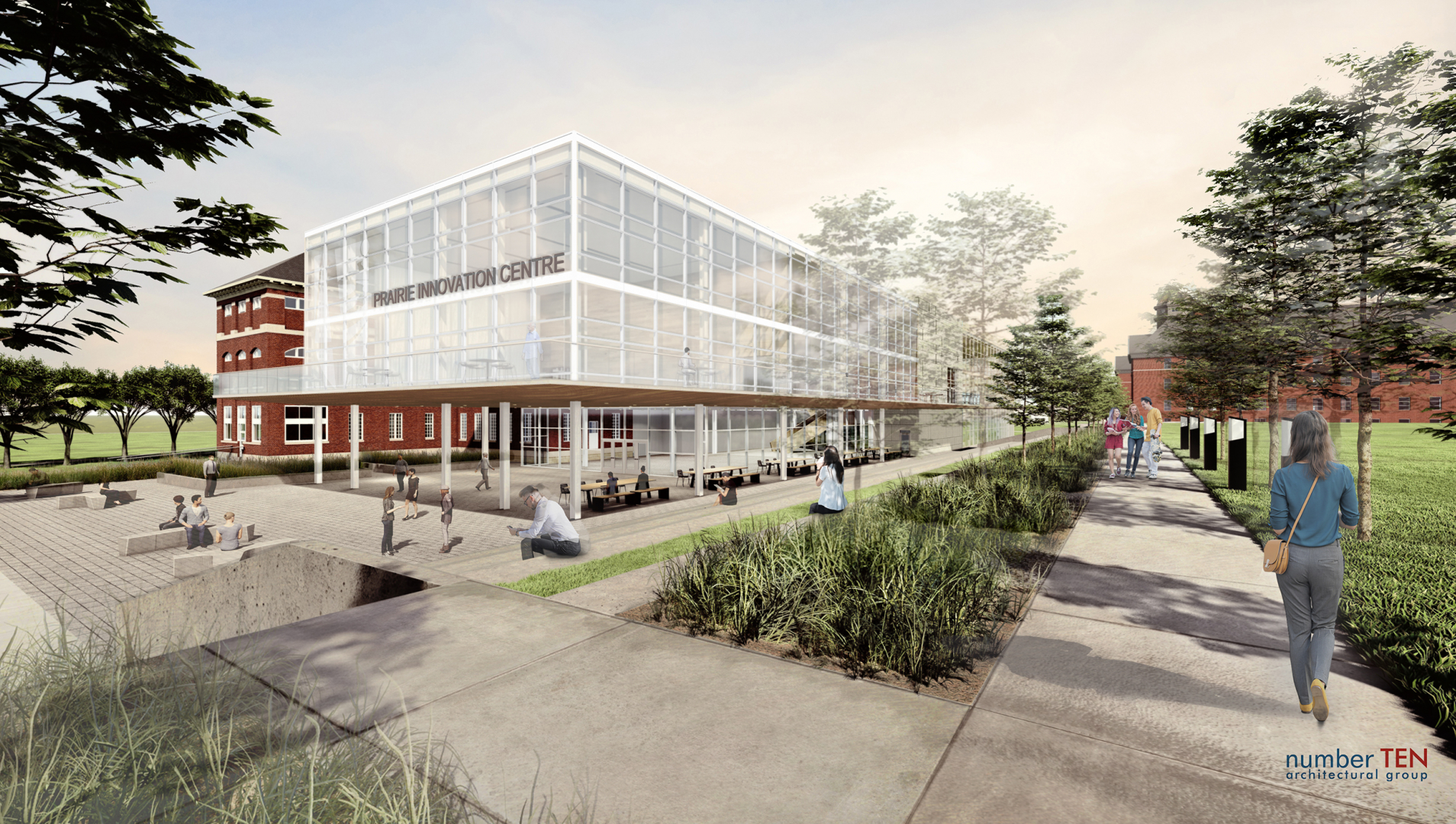Introducing the Prairie Innovation Centre
January 25, 2021
While Assiniboine Community College has offered agriculture programming for the past several decades, a renewed focus has the college investing big into agriculture and food. While maintaining a sharp focus on applied research and providing agricultural programming that is responsive to industry needs, the college is ready to take the next step.
This step—the Prairie Innovation Centre for Sustainable Agriculture. Uniting agricultural education, innovation and collaboration, and applied research, the Centre is Assiniboine’s vision for the future of agriculture in Manitoba, addressing industry and economic needs in this important and growing sector.
In 2018, Assiniboine’s strategic direction, with an emphasis on leadership in agriculture, led to the separation of the School of Agriculture and Environment into its own school. This change brought traditional agriculture programs like Agribusiness and Environmental Technologies, under an umbrella alongside programs like Culinary Arts. The re-alignment also brought technology programs, like Communications Engineering Technology (CET)and Civil Technician, into the fold. With the shift to a focus on digital and precision agriculture along with the technology revolution, programs like CET are increasingly benefitting from exposure to agricultural systems.
“Creating a school that provides a cohesive and holistic approach to agriculture is important, because the agriculture industry is evolving to a place where technology and food innovations are fundamental to things like agronomy, farming or land management.” said Tim Hore, Dean of the School of Agriculture and Environment at Assiniboine. “You can’t do one without having knowledge of the other parts.”
Johanne Ross, Executive Director of Agriculture in the Classroom Canada (AITC-C), advocates for agriculture education at all grade levels and showcases ag career opportunities to K-12 students. She’s seen that along with building a necessary awareness of where their food comes from, knowing more about agriculture can affect students’ futures.
“One of the biggest eye-openers for people is that agriculture carries career possibilities in a wide range of things, covering all interests in the STEM acronym – science, technology, engineering and mathematics,” said Ross, who is also a member of the Assiniboine Board of Governors and co-chairs the campaign cabinet for the college’s Prairie Innovation Centre.
No matter what career you’re looking at, we can relate it back to agriculture and food production.
And while it’s an undoubted positive that diverse careers exist, they’re also in high demand.
Agriculture is moving so fast in terms of innovation that we can’t keep up. We have a labour issue shortage, big time, in agriculture—everywhere. On the farm and off the farm, past the farmgate; everywhere, we need people.
She’s right. It’s projected that by 2025, one in five agriculture jobs in Manitoba could go unfilled and that’s bad news for the economy and could mean a staggering $725 million loss.
The good news—Assiniboine is on it.
The Prairie Innovation Centre, located at the college’s historic North Hill campus, will combine indoor and outdoor learning spaces for seamless, hands-on training experiences and aims to expand seats from less than 300 to more than 800 students in agriculture, environment and related ag-adjacent technology programs. It's a Manitoba-made response to labour market gaps in the agriculture industry and that in itself is an advantage.
The college launched the fundraising campaign for the Centre with a $1 million donation from Sunrise Credit Union in fall 2020 and by March 2021, had revealed more support from local industry, including Guild Insurance ($10k), Mid-Plains Implements ($50k), Wawanesa Insurance ($100k), Compass Credit Union ($25k) and The Brandon Sun ($50k).
“There has been such significant investment in the ag sector in Manitoba in recent years, and that will inevitably lead to other investors being interested in setting up shop here, which brings with it the need for skilled, trained talent,” said Hore.
And not only will the Prairie Innovation Centre help keep up with these labour needs, it will give back to industry through collaborative opportunities and continued applied research.
“The Centre will be recognized as a go-to problem solver for ag-related practical challenges and provide a space for industry and collaborators to seize new opportunities,” said Hore.
We look forward to extending and transferring the knowledge built here to the industry and primary agriculture producers in Manitoba.
While maintaining a major focus on fundraising for this major development in provincial agriculture training, the college is not slowing down in other respects. The college’s field to fork approach is already deep-seated into the School, bringing together education, applied research and extension to help strengthen local food chains find new ways to improve food security and build healthier and stronger communities.
Faculty researchers, Dr. Baljeet Singh, Dr. Poonam Singh and Dr. Sajjad Rao currently provide scientific leadership to applied research projects. And outside of the contributions toward the Prairie Innovation Centre, the college is continually seeking practical applied research funding opportunities. Students in agriculture and environment programs then have the opportunity to participate in field and lab activities related to the research.
Recent research grants and funding partnerships have contributed to various projects: looking at commercial sweet potato varieties to suit Manitoba’s climate; collaborating with Manitoba’s first large-scale vegetable greenhouse, Vermillion Growers, to produce local and sustainable produce; and identifying ways to manage white mould, which poses a serious threat to Manitoba’s dry beans.
“The emphasis that the college has on the future of agriculture means that now is a great time to be an ag student. Agriculture is evolving— it no longer depends solely on mother nature and the application of fertilizers and pesticides uniformly across entire fields,” said Hore. “Agriculture is a business and operations will need to be run differently in the future to meet advances in technology.”
The Prairie Innovation Centre will be at the forefront of this advancing industry, bringing the next generation of agriculture, environment and technology forward.




